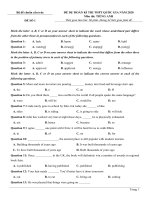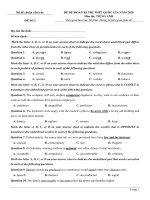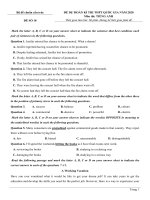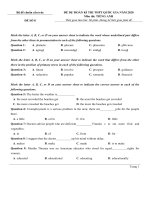đề chuẩn tiếng anh 2020 đề 9
Bạn đang xem bản rút gọn của tài liệu. Xem và tải ngay bản đầy đủ của tài liệu tại đây (153.97 KB, 10 trang )
Bộ đề chuẩn cấu trúc
ĐỀ DỰ ĐOÁN KÌ THI THPT QUỐC GIA NĂM 2020
Môn thi: TIẾNG ANH
Thời gian làm bài: 60 phút, không kể thời gian phát đề
ĐỀ SỐ 9
Mark the letter A, B, C or D on you answer sheet to indicate the word whose underlined part
differs from the other three in pronunciation in each of the following questions.
Question 1.
A. whispered
B. wandered
C. sympathized
D. sentenced
Question 2.
A. compile
B. facile
C. facsimile
D. textile
Mark the letter A, B, C, or D on your answer sheet to indicate the word that differs from the other
three in the position of the primary stress in each of the following questions.
Question 3.
A. carpet
B. country
C. idea
D. volume
Question 4.
A. familiar
B. uncertainty
C. impatient
D. arrogantly
Mark the letter A, B, C, or D on your answer sheet to indicate the correct answer to each of the
following questions.
Question 5. I demand to know how this vase_____________, and no one is leaving till I find out.
A. got broken
B. was breaking
C. has broken
D. is broke
Question 6. The more you practice speaking in public, _____________.
A. the more you become confident
B. the more you become confidently
C. the greater confidence you become
D. the more confident you become
Question 7. It is said the Robinhood robbed_____________rich and gave the money to poor.
A. a/ a
B. a/ the
C. the/ the
D. the/ a
Question 8. Not only_____________among the largest animals that ever lived, but they are also among
the most intelligent.
A. some whales
B. they are whales
C. whales
D. are whales
Question 9. _____________, he couldn’t finish that test in 60 minutes.
A. Intelligent as was the boy
B. As intelligent the boy was
C. As the boy was intelligent
D. Intelligent as the boy was
Question 10. There is no excuse for your late submission! You_____________the report by last
Monday.
A. should have finished
B. mightn’t have finished
C. needn’t have finished
D. must have finished
Question 11. My parents lent me the money. _____________, I couldn’t have afforded the trip.
A. Therefore
B. Otherwise
C. Only if
D. However
Trang 1
Question 12. The biologists have found more than one thousand types of butterflies in the forest,
_____________its special characteristics.
A. each one has
B. which has
C. each having
D. having
Question 13. John is feeling_____________because he hasn’t had enough sleep recently.
A. irritate
B. irritation
C. irritably
D. irritable
Question 14. Jenny has an_____________command of Japanese cuisine.
A. intensive
B. utter
C. impressive
D. extreme
Question 15. why are you always so jealous_____________other people?
A. in
B. of
C. below
D. on
Question 16. The head teacher has asked me to take the new boy under my_____________and look
after him.
A. sleeves
B. arm
C. wing
D. cloak
Question 17. The online game “Dumb ways to die” quickly_____________with young people after
being released in 2013.
A. took on
B. caught up
C. caught on
D. took up
Question 18. Just think! Next month you’ll be_____________and it seems like only yesterday you
were a baby.
A. in your teens
B. in your teenage
C. teenager
D. at your teens
Mark the letter A, B, C, or D on your answer sheet to indicate the underlined part that needs
correction in each of the following questions.
Question 19. The children are extremely excited about the visit to the town where their grandparents
were born in.
A. about
B. were
C. where
D. the town
Question 20. Chandler was shocked when his entire class seemed to come down with the same
imaginative disease.
A. was shocked
B. entire class
C. come down with
D. imaginative disease
Question 21. Transgender people are denied the ability to join the armed forces due to discriminating
policies implemented by the government.
A. Transgender
B. are denied
C. armed forces
D. discriminating
Mark the letter A, B, C or D on your answer sheet to indicate the sentence that is closest in
meaning to each of the following questions.
Question 22. “Please, let my child go!” she begged the kidnapper.
A. She begged the kidnapper to let her child to go.
B. She pleaded with the kidnapper to release her child.
Trang 2
C. She solemnly ordered the kidnapper to set her child free.
D. She pleaded the kidnapper to let her child go.
Question 23. Sometimes having professional assistance with your CV can increase your chance of
finding a job.
A. Having your CV professionally prepared determines whether you'll get the job or not.
B. The prospects for finding employment can possibly be enhanced by a professionally produced CV.
C. Having a professional help you with your CV is a sure way to find a job.
D. Without a professional CV, it is impossible to find a job
Question 24. It seems to me that we’ve taken the wrong train.
A. The trained turned out to be not the one we were supposed to have taken.
B. There is no chance that we’ll catch the train that we’re supposed to.
C. I have a feeling that this train is not the one we should be on.
D. I wish we had been more careful and taken the right train from the station.
Mark the letter A, B, C or D on your answer sheet to indicate the sentence that best combines
each pair of sentences in the following questions.
Question 25. She was the first woman in the Philippines. She was elected as the president of the
country.
A. She was the first woman who is elected as the president of the Philippines.
B. She was the first woman elected as the president of the Philippines.
C. She was the first woman being elected as the president of the Philippines.
D. She was the first woman to be elected as the president of the Philippines.
Question 26. They are my two sisters. They aren’t teachers like me.
A. Unlike me, neither of my two sisters aren’t teachers.
B. They are my two sisters, both of those are teachers like me.
C. They are my two sisters, neither of whom is teacher like me.
D. They are my two sisters who neither are teachers like me.
Mark the letter A, B, C or D on your answer sheet to indicate the most suitable response to
complete each of the following exchanges.
Question 27. Tony and Bob are talking in their classroom.
Tony: “We are buying Lily a graduation present.” - Bob: “_____________”
A. She’s out of my league.
B. Can you all be more down-to-earth?
C. I’m raking in money now.
D. Could I chip in?
Question 28. Mai and Joey are talking about their favorite pastimes.
Joey: “What sort of things do you like doing in your free time?” - Mai: “_____________”
Trang 3
A. I love checking out the shops for new clothes.
B. None. Been starved since 9 yesterday.
C. I hate shopping.
D. Nothing special. Just some photos I took on the trip to Nepal.
Mark the letter A, B, C, or D on your answer sheet to indicate the word or phrase that is
CLOSEST in meaning to the underlined part in each of the following questions.
Question 29. Some operations may have to be halted unless more blood donors come forward to help.
A. offer
B. claim
C. attempt
D. refuse
Question 30. The natives were angry when foreigners came to their country and took over their land.
A. migrants
B. tourists
C. members
D. locals
Mark the letter A, B, C, or D on your answer sheet to indicate the word or phrase that is
OPPOSITE in meaning to the underlined part in each of the following questions.
Question 31. Later a wine reception will be followed by a concert before guests tuck into a banquet.
A. a formal party
B. a formal conference
C. an informal party
D. an enormous breakfast
Question 32. The nominating committee always meet behind closed doors, lest its deliberations
become known prematurely.
A. dangerously
B. safely
C. privately
D. publicly
Read the following passage and mark the letter A, B, C or D on your answer sheet to indicate the
correct word for each of the blanks from 33 to 37.
Left-handers are the odd ones out. Sure, lefties (33) _____________up about 10 percent of the
population - but, frankly, it seems like society has forgotten about them. Just consider all of the righthanded gadgets, awkwardly designed desks, and cooking tools that fit comfortably only in your right
hand, what (34) _____________someone to become a lefthand? Scientists aren’t exactly sure, but
research points to a complex (35) _____________between genes and environment.
While no exact set of “leftie genes” have been discovered, people who dominantly use their left hands
do have more left-handed family members. And researchers have found different brain wirings in
righties vs. lefties. But no matter (36) _____________it is that drives someone to use their antipodal
paw, science has also uncovered a particular set of personality traits that lefthanded people tend to
have. So for all of you lefties, leftie-loving righties, and ambidextrous folks out there - it’s time to
brush up on your left-handed knowledge and help (37) _____________an end to leftie discrimination
once and for all.
Question 33.
A. consist
B. account
C. hold
D. make
Trang 4
Question 34.
A. causes
B. makes
C. gets
D. does
Question 35.
A. collaborate
B. collaboration
C. collaborating
D. collaborated
Question 36.
A. which
B. who
C. what
D. that
Question 37.
A. put
B. bring
C. make
D. take
Read the following passage and mark the letter A, B, C or D on your answer sheet to indicate the
correct answer to each of the questions.
Trees are useful to man in three very important ways: they provide him with wood and other products,
they give him shade, and they help to prevent drought and floods.
Unfortunately, in many parts of the world man has not realized that the third of these services is the most
important. In his eagerness to draw quick profit from the trees, he has cut them down in large numbers,
only to find that without them he has lost the best friends he had.
Two thousand years ago a rich and powerful country cut down its trees to build warships, with which to
gain itself an empire. It gained the empire but, without its trees, its soil became hard and poor. When the
empire fell to pieces, the country found itself faced by floods and starvation.
Even though a government realizes the importance of a plentiful supply of trees, it is difficult for it to
persuade the villager to see this. The villager wants wood to cook his food
with, and he can earn money by making charcoal or selling wood to the townsman. He is usually too lazy
or too careless to plant and look after trees. So unless the government has a good system of control, or can
educate the people, the forests will slowly disappear.
This does not only mean that there will be fewer trees. The results are even more serious. For where there
are trees their roots break the soil up, allowing the rain to sink in and also bind the soil, thus preventing it
being washed away easily, but where there are no trees, the soil becomes hard and poor. The rain falls on
hard ground and flows away on the surface, causing floods and carrying away with it the rich topsoil, in
which crops grow so well, when all the topsoil is gone, nothing remains but a worthless desert.
Question 38. In the writer's opinion, _____________, or the forests slowly disappear.
A. people shouldn't draw benefit from the tree
B. measures must be taken
C. government must realize the serious results
D. unless trees never be cut down
Question 39. The word “bind ” in the passage probably means___________
A. to make wet
B. to wash away
C. to make stay together D. to improve
Question 40. In the last two paragraphs the writer wanted to make it clear that____________
A. where there are no trees, the soil becomes hard and poor
B. where there are no trees, the land might become desert slowly
C. where there are many trees, there are fewer floods
Trang 5
D. floods will make the land become desert
Question 41. It’s a great pity that in many places____________
A. man is not eager to make profits from trees
B. man hasn’t found out that he has lost all trees
C. man hasn’t realised the importance of trees to him
D. man is only interested in building empire
Question 42. Trees are useful to man mainly in three ways, the most important of which is that they
can ____________
A. keep him from the hot sunshine
B. make him draw quick profit from them
C. enable him to build warships
D. protecthim from drought and floods
Read the following passage and mark the letter A, B, C or D on your answer sheet to indicate the
correct answer to each of the questions.
PERCEPTIONS OF ANIMALS ACROSS CULTURES
When living and working in another country, there are numerous things to consider apart from the more
obvious ones of climate, language, religion, currency, etc. Some important considerations are less
obvious. For example, do you have a pet or do you enjoy a hobby such as horse riding? Your animal or
hobby may be perceived in a completely different light in another culture so it’s important to consider the
significance given to specific animals in different parts of the world and general perceptions towards
them.
One example which is often mentioned in popular press is the case of dogs. In some cultures,
like the US or UK, dogs are loved and considered a great pet to have at home and with the family. In
other cultures, such as those where Islam is the majority religion, dogs may be perceived as dirty or
dangerous. Muslims treatment of dogs is still a matter of debate amongst Islamic scholars, while these
animals are widely considered by many Western cultures to be “mans best friend”, the Koran describes
them as “unhygienic”. Muslims will therefore avoid touching a dog unless he can wash his hands
immediately afterwards, and they will almost never keep a dog in their home.
In Iran, for instance, a cleric once denounced “the moral depravity” of dog owners and even demanded
their arrest. If you are an international assignee living and working in Saudi Arabia or another Arabic
country, you should remember this when inviting Arab counterparts to your house in case you have a dog
as a pet. This is just one example of how Islam and other cultural beliefs can impact on aspects of
everyday life that someone else may not even question. A Middle Eastern man might be very surprised
when going to Japan, for instance, and seeing dogs being dressed and pampered like humans and carried
around in baby prams!
Dogs are not the only animals which are perceived quite differently from one culture to another. In India,
for example, cows are sacred and are treated with the utmost respect. Conversely in Argentina, beef is a
Trang 6
symbol of national pride because of its tradition and the high quality of its cuts. An Indian working in
Argentina who has not done his research or participated in a cross cultural training programme such as
Doing Business in Argentina may be surprised at his first welcome dinner with his Argentinean
counterparts where a main dish of beef would be served.
It is therefore crucial to be aware of the specific values assigned to objects or animals in different cultures
to avoid faux-pas or cultural misunderstandings, particularly when living and working in another culture.
Learning how people value animals and other symbols around the world is one of the numerous cultural
examples discussed in Communicaid’s intercultural training courses. Understanding how your
international colleagues may perceive certain animals can help you ensure you aren’t insensitive and it
may even provide you with a good topic for conversation.
(Source: https. //www.communicaid.com)
Question 43. What does the author suggest in the last paragraph?
A. Talking about different perceptions with others will help you overcome insensitivity.
B. To avoid cultural shocks, people should not live or work in another culture.
C. It’s important to value the objects or animals in different countries before going there.
D. Understanding different perceptions of animals will help you avoid faux-pas in another nation.
Question 44. According to paragraph 2, which sentence is INCORRECT?
A. The dog is a typical example of different views in the world about animals.
B. Dogs are well-treated and loved in the US and UK.
C. Muslims are those considering dogs as their best pets at home.
D. People whose religion is Islam don’t like having dogs in their home.
Question 45. The word “unhygienic” in the second paragraph is closest in meaning to____________
A. unhealthy
B. undependable
C. unreliable
D. unacceptable
Question 46. What does the word “this” in paragraph 3 refer to?
A. you are an international assignee
B. you are having a dog as pet
C. a cleric once denounced the moral depravity of dog owners and even demanded their arrest
D. you are living and working in Saudi Arabia or another Arabic country
Question 47. The author mentioned cows in paragraph 4 as an example of______________
A. the animals that are differently perceived in numerous cultures
B. sacred animals in Argentina
C. a symbol of a nation for its high quality of nutrients
D. which may cause surprise for Argentinian people at dinner
Question 48. which of the following could be the main idea of the passage?
A. Perceptions of animals across cultures
B. What should be learnt before going to another country
Trang 7
C. Dogs and different beliefs in the world
D. Muslims and their opinions about animals
Question 49. The word “pampered” in the third paragraph could be best replaced by____________
A. indulged
B. taken care of
C. made up
D. respected
Question 50. It can be inferred from the passage that______________
A. people will change their perceptions of animals when living in another culture
B. you should not be surprised if other counterparts consider your sacred animals as food
C. there are many things to research before going to live and work in another country
D. respecting other cultures is a good way to have a successful life abroad
Trang 8
Đáp án
1-D
2-C
3-C
4-D
5-A
6-D
7-C
8-D
9-D
10-A
11-B
12-C
13-D
14-C
15-B
16-C
17-C
18-A
19-C
20-D
21-D
22-B
23-B
24-C
25-D
26-C
27-D
28-A
29-A
30-D
31-C
32-D
33-D
34-A
35-B
36-C
37-A
38-B
39-C
40-B
41-C
42-D
43-D
44-C
45-A
46-C
47-A
48-A
49-B
50-C
LỜI GIẢI CHI TIẾT
Question 1: Đáp án D
Đáp án D đúng vì phần gạch chân của đáp án D được đọc là /t/. Các phương án còn lại phần gạch chân
được đọc là /d/.
A. whispered /ˈwɪspə(r)d/ (v)/(n): nói thì thầm (v)/ tiếng xì xào (n)
B. wandered /ˈwɒndə(r)d/ (v): đi lang thang
C. sympathized /ˈsɪmpəθaɪzd/ (v): cảm thông
D. sentenced /ˈsentənst/ (v)/(n): kết án (v)/ câu văn (n)
* Note: Chúng ta cần ôn tập lại quy tắc phát âm đuôi “-ed”
-ed được phát âm là:
/ɪd/
/t/
/d/
Khi tận cùng của từ là:
/t/ hoặc /d/
Các phụ âm vô thanh: /s/, /ʃ/, /tʃ/,
/k/, /p/, /f/, /θ/
Các âm hữu thanh còn lại
Ví dụ
decided, accepted, visited
missed, stopped, washed, ranked,
approached, sentenced
involved, played, whispered,
wandered, sympathized
Question 2: Đáp án C
Đáp án C đúng vì phần gạch chân của đáp án C được đọc là /əli/. Các phương án còn lại có phần gạch
chân được đọc là /aɪl/.
A. compile /kəmˈpaɪl/ (v): biên soạn
B. facile /ˈfæsaɪl/ (adj): dễ dàng, đơn giản
C. facsimile /fækˈsɪməli/ (n): bản sao, bản chép
D. textile /ˈtekstaɪl/ (n): vải dệt
Question 3. Đáp án C
Đáp án C đúng vì đáp án D trọng âm rơi vào âm thứ hai. Các phương án còn lại trọng âm rơi vào âm đầu
tiên.
A. carpet /ˈkɑːpɪt/ (n)/(v): cái thảm (n)/ trải thảm, chỉ trích (v)
B. country /ˈkʌntri/ (n): đất nước
C. idea /aɪˈdɪə/ (n): ý tưởng, quan điểm
D. volume /ˈvɒljuːm/ (n): âm lượng, số lượng
Trang 9
Question 4. Đáp án D
Đáp án D đúng vì đáp án D trọng âm rơi vào âm thứ nhất. Các phương án còn lại trọng âm rơi vào âm thứ
hai.
A. familiar /fəˈmɪliə(r)/ (adj)/(n): thân mật, quen biết (adj)/ người thân cận (n)
B. uncertainty /ʌnˈsɜːtnti/ (n): tính không chắc chắn
C. impatient /ɪmˈpeɪʃnt/ (adj): sự nóng nảy, mất kiên nhẫn
D. arrogantly /ˈærəɡəntli/ (adv): một cách kiêu ngạo
Ấn vào đây để xem tiếp lời giải
Ấn vào đây để tải file Word đề thi này
Trang 10









